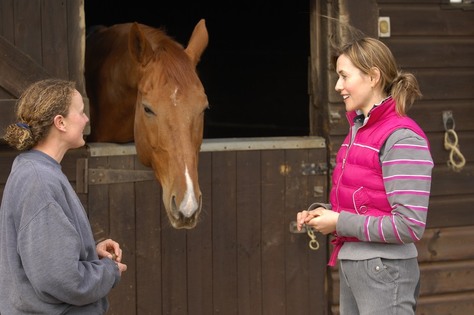
Are You & Your Horse Ready For Bitting Advice? The Steps You Need To Consider First
Equestrian Advice & Guides All Disciplines
Build your business profile for FREE and expose your services to thousands of potential clients!
Create my profile now!
Several livery yards can be situated in the same locality, often even more so in rural areas where the equine population is at its highest. Chances are if a horse owner in your area is looking for livery, then you won’t be the only option! Many yard owners see other yards in their area as competition… for their clients, their facility hire, and their income. But there is no need to have a ‘them and us’ mentality, in fact creating good working relationships with fellow yard owners in your area can help you run your yard better and deal with your clients more effectively.
As a yard owner, you are a business owner. Networking is a key aspect of running any business, and running a yard is no exception. By keeping regular contact and lines of communication open with your other local yard owners, this can help in all manner of ways, and best of all it costs nothing. Whilst networking does not come naturally to many people, it really is just a case of sharing knowledge, information and resources.
1. Bio security:
Probably the most important aspect of keeping in contact with your local yards. You can be alerted quickly and directly if there are any cases of infectious disease or illnesses- such as equine influenza or strangles- in your area and this will help you act quicker and thus reduce the likelihood of any horses from your yard being exposed to potential infection. Similarly, if you have a case, or even a potential case, of an infectious disease on your own yard then it’s a good idea to inform other yards locally so they can be made aware. Having a network in place will allow you to carry out things like this without delay.
Many yards these days are introducing biosecurity protocols for new liveries to ensure no infectious diseases are being brought in from other yards. However, many established yards just do not have the space, facilities or funds to set up effective isolation areas. Isolation is a neutral procedure and, in theory, is irrelevant whether carried out at your yard or elsewhere.
Perhaps you have a yard nearby that can offer isolation facilities for your potential clients, or perhaps you have those you can offer to other local yards. As long as isolation is carried out correctly, away from the main yard and there is no cross contamination during the isolation period then its fairly risk free for yard owners to share such facilities for a horse to then be taken to its new yard when it’s got the all clear. Certainly worth considering if an arrangement can be made.
2. Filling vacancies
On occasions you may be contacted by potential liveries that for one reason or another you are unable to accommodate. It may be that you get approached by a horse owner wanting a package or facilities you do not offer, but that a yard down the road does and you know if they have any availability in which case you can. In which case if you know of other yards locally that have vacancies or may suit them better you can pass on their details and redirect them there.
The same could be said for other yard owners doing the same for you- if you let them know when you’ve got vacancies- and if they are unable to accommodate a potential client, to send them in your direction.
If any local yards close, downsize or change their services, their liveries may be looking to relocate and – assuming the location is ideal- they’ll likely want to be somewhere else local and its great of the other yard owner can point them in your direction.
3. Bad liveries
Wouldn’t it be great to be given a heads up if there are liveries looking for vacancies that are only looking because they have caused issues at other local yards and been asked to leave? Its unlikely potential clients will disclose where or why they have left the previous yard if it’s for a negative reason, and you could unwittingly end up with someone who will cause issues or end up owing you money on the yard. There are also ‘yard hoppers’ who just cannot settle on a yard, or cause problems for the yard owner or other liveries and are swiftly moved on.
In such cases it would be great to know in advance the name of such liveries so that you can be at least partly informed of any potential issues before they make contact. Of course, just because one horse owner and yard owner do not get on, does not mean they are an all round ‘bad livery’ and the decision should be yours to carry out your own due diligence on any potential liveries. There’s no harm in showing people round and just being honest if you do not feel they are right for the yard.
4. Sharing costs
Many yards buy items in bulk these days to help reduce costs- hay, feed, bedding to name the most common. However, many are limited by storage sizes meaning bigger discounts can still be had. What would be even better is to have a couple of yards in the local vicinity coordinate their hay or feed deliveries and save even more. Its worth contacting your local yards to see which suppliers they use and if they would be interested in sharing and coordinating deliveries- this would at least save on the delivery costs, and no doubt a better discount could be haggled withy suppliers for a larger quality ordered.
The same could be done for farrier visits, vet visits, saddler, freelance grooms and all manner of other equine professionals which they will greatly appreciate to condensing their workload into a smaller area, and should work out slightly cheaper for all involved.
5. Facility hire
Perhaps there are yards just a short way from you that have facilities you do not, or are unable to, offer- cross country schooling, jumping paddock, indoor arena, gallops, farm tracks, things which would be great for you to be able to offer use of to your own clients. Its possible that you could strike a deal with other local yard owners to offer your clients a rate inclusive of the use of their facilities.
This is something that would take some discussion, and other yard owners may be unwilling to share their facilities, but it is certainly something worth considering, especially if you also have facilities they are lacking that could be used in return.
Another option is just the opportunity to be able to hire facilities locally that don’t need transport and are easily accessed. It may be that other local yard owners do not hire their facilities as standard but perhaps an agreement could be had for a regular hire slot or the ability of your clients to exclusively hire the facilities as a group.
6. Running events
If you run clinics or events at your yard, get other local yards on board too. Let them know what’s happening and when and invite them along. The increased number of entries will be beneficial to you, and they have the advantage of a local event that they don’t need transport to.
It doesn’t have to be ridden events, but perhaps training or social events such as a feed company with a weigh bridge or an informative talk. Perhaps you could organise inter-yard social events or shows which allows a like-minded group of people to get to know others in their area. It’s great for your liveries to know other horse owners locally even just for for sharing transport, facility hire, or even just as riding companions.
7. Security and Emergencies
In many local areas there are ‘Horsewatch’ branches run by the local police force. These are designed to inform yard and farm owners of any suspicious activity in their area. You can, of course, do this yourself buy setting up a local group and ensuring that details are shared of any suspicious activity, and to warn other yard owners in the event of thefts or damage. Rural rime is likely carried out in a ‘spate’ in a local area so such a group is an excellent way to quickly share any information and to ensure all local yard owners stay vigilant.
Similarly, a prompt network is great in the event of an emergency. Say someone spots a problem at your yard, or horses running loose, a network between yard owners means issues like this can be communicated directly to quickly identify who needs to know and to get them told. If you have an emergency on the yard where you need other experienced horse owners, or transport, or emergency stabling then having that network of locals with the facilities or resources can only be advantageous.
8. Staffing
Many yard owners rely heavily on their staff, whilst many run their yard single handedly. Staffing can be an issue, especially if you are relying on staff to run a busy yard and someone leaves without notice or needs time off due to illness. It can make it almost impossible sometimes to run the yard without staff, especially if you have a yard full of horses all requiring services.
In which case you may be able to contact local yard owners and see if they have any staff they can spare, or anyone they use freelance that may be able to help. You’d be being given, a trusted and solid recommendation, and should be willing to do the same in return if other yard owners had a similar predicament.
It’s also worth telling other local yard owners if you are recruiting staff as they will often know people looking for work.
Networking does not mean you necessarily need to build friendships with other local yard owners. The main purpose of networking is for the sharing of ideas, resources and knowledge and for everyone to benefit. Do not see other local yards as competition and feel the need to stalk them online or send in a ‘spy’ to see what they offer- be honest and upfront.
Go and meet your local yard owners, look at what they have, be open about charges and costs. It can be beneficial to both parties to be open and honest. You may help each other find solutions to problems, cut costs or share ideas.
This will give you a business connection which can only be fruitful and advantageous. You may also find friendships form because at the end of the day you will more than likely be like-minded people with a lot in common. At the very least, having that line of communication between yard owners- even if not used regularly and just when needed- can be of use to everyone involved.
Ways you can connect with your local yard owners:
LiveryList – the UK’s #1 Livery Yard Directory - runs the Livery Yard Owners UK- Discussions and Advice Facebook group which was established in 2016. With almost 1000 verified yard owners across the UK, it’s a great way to network with fellow yard owners on a national and local level. There’s a member map so you can see who is in your area for exactly the purpose of this article, and it’s helped many yard owners share advice, support and recommendations.

